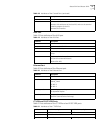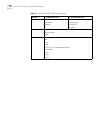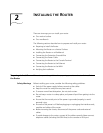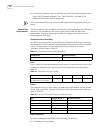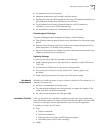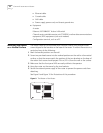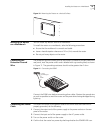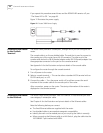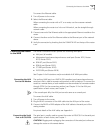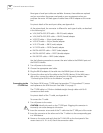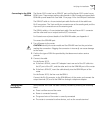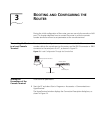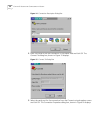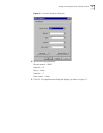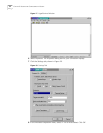
Connecting the Router to the WAN 25
To connect the Ethernet cable:
1 Turn off power to the router.
2 Select the Ethernet cable.
When connecting the router with a PC or a router, use the crossover network
cable.
When connecting the router to a hub or a LAN switch, use the straight-through
network cable.
3 Connect one end of the Ethernet cable to the appropriate Ethernet module on the
router.
4 Connect the other end of the Ethernet cable to the Ethernet port of the network
device.
5 Verify the connection by checking that the 100M ETH LED on the top of the router
is on.
Connecting the Router
to the WAN
The Router 3000 series routers provide the following WAN ports:
■ AUX port (all models)
■ Mutiprotocol synchronous/asynchronous serial port (Router 3012, Router
3013, Router 3015)
■ ISDN S/T port (Router 3013)
■ ISDN U port (Router 3015)
■ CT1/PRI port (Router 3016)
■ E1/CE1/PRI port (Router 3018)
See Chapter A for illustrations and pinout details of all WAN port cables.
Connecting the AUX
Port to the Modem
The auxiliary (AUX) port is an EIA/TIA-232-compliant synchronous/asynchronous
serial port that is used for remote configuration or dial-up backup. To connect the
router to a remote device, a local modem must be connected to a remote modem
through PSTN. For the connection method, see
Chapter 3. For the AUX port
specifications of each router, see Chapter 1.
If the console port fails, the AUX port can also serve as a console port.
To connect the AUX cable:
1 Turn off power to the router.
2 Plug the RJ-45 connector of the AUX cable into the AUX port of the router.
3 Connect the DB-25 or DB-9 adapter of the AUX cable to the serial port of the
analog modem.
For pinout details of the AUX cable, see Appendix A.
Connecting the Serial
Port to a CSU/DSU
The serial port is usually used to connect the router to DSU/CSU. For the serial port
specifications of each router, see
Chapter 1.
CAUTION: Plugging and unplugging the connectors of the serial port online can
damage the router or the remote device.



